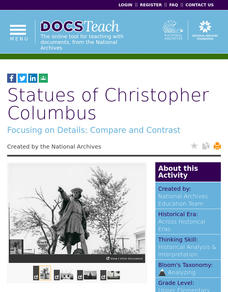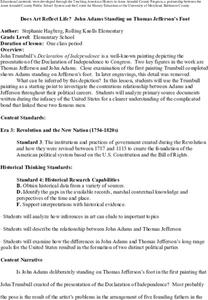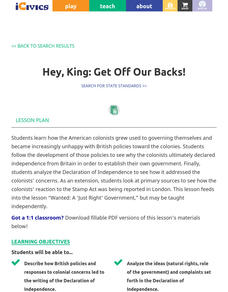Core Knowledge Foundation
Unit 2: Early American Civilizations
Fifth graders explore early American civilizations in a four-week ELA unit. Every lesson offers an opportunity to read and discuss a selected passage followed by word work that covers vocabulary, grammar, and morphology. Learners write...
Core Knowledge Foundation
A History of the United States
This 262-page Core Knowledge teacher guide presents an overview of the two-volume History of the United States program designed for middle schoolers. The guide includes information about the learning strategies used, a pacing guide, the...
Core Knowledge Foundation
Volume 1 - A History of the United States: Precolonial to the 1800s
Volume One of the 299-page Core Knowledge History of the United States covers events from the Precolonial Period to the 1800s.
Benjamin Franklin Tercentenary
Franklin’s Fair Hand American Journalism
Scholars know him for his role in the American Revolution, but Ben Franklin was also a journalist and printer. Learners investigate his standards for what was fit to print using primary sources—including writings where Franklin explains...
Curated OER
Native Americans of the Chesapeake Bay: Using Primary vs. Secondary Sources
Discover the rich Native American culture that existed at the time of early European exploration into the Chesapeake region through analysis of several primary and secondary sources.
K20 LEARN
Give Me Liberty or Give Me Death: The Journey to Revolution
The words of "Common Sense" and Patrick Henry's "Give me liberty or give me death!" speech ring throughout history. Scholars explore the nuances of each patriot's argument using excerpts from the famous pamphlet and speech and a recorded...
K20 LEARN
Analyzing Early American Figures: Analyzing History
Who were they? High school freshmen brush up on their research skills by investigating an important person in American history. They select a name, fill out a KWHL chart, and research why their person is important. Scholars then complete...
K20 LEARN
The Spiro Mounds Builders: Oklahoma History
Long before European settlers arrived on the shores of what is now the United States, pre-contact Native American cultures thrived. Young scholars investigate the Spiro Mounds Builders' history and learn how archaeologists put together...
Carolina K-12
Early American Settlements
What brought settlers from Europe to North America? By exploring primary sources, such as posters seeking recruits for the new lands, class members take a deeper look at these motivations. To finish, they present their findings to...
DocsTeach
Statues of Christopher Columbus
Scholars compare statues of Columbus and discuss how each memorial captures his personality. Academics also complete a worksheet and discuss how some people have called to remove statues honoring Columbus.
Simon & Schuster
A Teacher's Guide to 1776 by David McCullough
David McCullough's Pulitzer Prize-winning novel, 1776, is the focus of a 28-page teacher's guide. The guide includes pre-reading questions, background information about key British and American figures, and chapter-by-chapter lessons.
Center for History Education
Why is John Adams Standing on Thomas Jefferson's Foot?
Was it a bromance, or were they frenemies? Young historians use a controversial portrait and letters between Thomas Jefferson, John Adams, and others to evaluate the relationship between the two Founding Fathers. Examining the primary...
Roy Rosenzweig Center for History and New Media
George Washington: General, President, Slave Owner
Times change; behaviors that were once considered acceptable can be seen in a very different light. Middle schoolers revisit the legacy of George Washington in a three-day lesson plan that uses primary sources to reveal Washington as a...
DocsTeach
Analyzing a Map of the Louisiana Purchase
With the stroke of a pen, Thomas Jefferson roughly doubled the size of the United States. The Louisiana Purchase not only grew the new country, but also it gave rise to the legends surrounding westward expansion and accelerated the...
National Endowment for the Humanities
The Creation of the Bill of Rights: “Retouching the Canvas”
While the Constitutional Convention lay the foundation of the new government for the United States, the protections given under the Bill of Rights were controversial. Using documents, such as James Madison's and Thomas Jefferson's...
Judicial Branch of California
Articles of Confederation…Well, They Were Trying!
Different currencies, multiple armies, unreliable protection from thieves: class members experience these challenges playing a game that demonstrates life under the Articles of Confederation. After playing the game—which takes them on a...
National Woman's History Museum
Utilizing Historic Sites for National History Day Research
The National History Day Research program is designed to permit young historians to interview the staff at any historic site. As part of Women's History Month, class members select a site that focuses on the contributions of women. Using...
Roy Rosenzweig Center for History and New Media
American Indians and their Environment
People could take a page in ingenuity and survival from the Powhatans. Deer skins became clothes, and the members of the Native American group farmed the rich Virginia soil and hunted in its forests for food. Using images of artifacts...
Roy Rosenzweig Center for History and New Media
Founding Documents
Teach the class about the predecessor to Declaration of Independence—the Virginia Declaration of Rights. Using the foundational documents, scholars examine the two writings to consider how they are similar and how they are different. A...
Core Knowledge Foundation
Early American Civilizations Tell It Again!™ Read-Aloud Anthology
Bridge subjects ancient history and English language arts together with a unit all about the Maya, Aztec, and Inca civilizations. Eleven lessons begin with a read-aloud followed by a whole-class discussion in preparation for practice by...
iCivics
Hey, King: Get Off Our Backs!
Young historians explore the reason American colonists were unhappy under British rule. Class members complete hands-on activities and participate in a group discussions to understand why colonists drafted the Declaration of Independence.
History with Peters
A Clear Signal for Change: Multiple Interpretations and Nat Turner’s Rebellion
Was Nat Turner a hero or a violent criminal? Using primary sources and images that discuss the rebellion of enslaved people he led in antebellum Virginia, scholars consider the question. Then, they create memorials to Turner and...
Benjamin Franklin Tercentenary
Many Bens: Character Revealed in Writing
Benjamin Franklin may be known as a Founding Father, but he was also a prolific writer. Scholars examine his better-known pieces to learn about genre, voice, and early American history. The resource includes options for various...
Benjamin Franklin Tercentenary
Join, or Die: Reenacting the Albany Conference
The Albany Congress was one of the first attempts at colonial unity. While it was an effort against the French during the French and Indian War, it was one of the events leading up to the American Revolution. Scholars consider the...

























